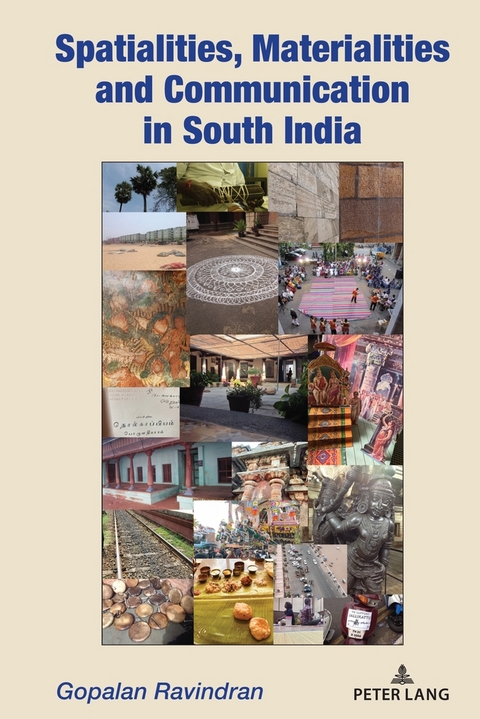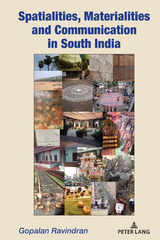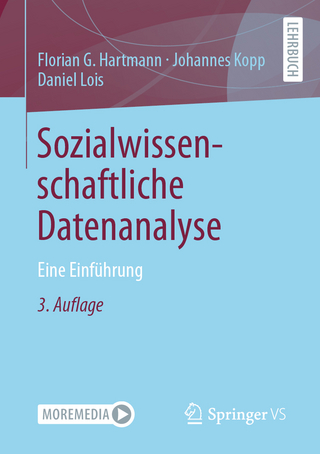Spatialities, Materialities and Communication in South India
Peter Lang Publishing Inc (Verlag)
978-1-4331-9230-2 (ISBN)
The spatial and material dimensions of communication have changed dramatically over the past three millennia in South India. The historical and contemporary trajectories of these changes are revealed, explored, documented, critiqued and examined in this work. This book is comprehensive in its engagements with three locations—spatiality, materiality and communication, in the contexts of Tamil Nadu, South India. The book takes a multidisciplinary approach to communication and media studies. It leverages the multifaceted knowledge seeking spirit of the ancient philosophers of Tamil Nadu for understanding the contexts of spatialities, materialities and communication.
Across four sections on historical trajectories, everyday lives, public communication and media materialities, its 20 chapters on diverse topics offer unique engagements of the spatial journeys of people, rulers, philosophers, men, women, as well as their material objects, occupations and media during the past three millennia in South India, with a focus on Tamil Nadu.
Gopalan Ravindran received his PhD from the University of Madras. He is Dean of the School of Communication and Head of the Department of Media and Communication at the Central University of Tamil Nadu, India. He is the editor of Deleuzian and Guattarian Approaches to Contemporary Communication Cultures in India (2020).
Illustrations – Acknowledgments – Introduction – From Rock Art through Palm Manuscripts, Stone Epigraphy, and Sculptures: Materialities and Spatialities of Ancient and Medieval South India – Colonial Contestations and Encounters of the Spatialities and Materialities of Natives and Their Rulers – Exploring the Spatialities, Materialities, and Temporalities of Communication in 18th- Century Pondicherry with Anandarangam Pillai’s Diaries – Everyday Lives, Communication, Marginalized Spatialities and Materialities in Chennai – The Cultural Politics of Noise, Sound, and Music in South India – Materialities of Everyday Life of Fishermen at the Crossroads of Spatial Politics – Spatial Transformations and Social Subjects: The Political Economy of Space in Chennai – Materialities of Food Cultures, Communication, and Their Contested Spaces in South India – The Fractured Right to Movement, Public Communication, and Other Implications of Postcolonial Spatialities in Tamil Nadu – Discordant Notes: Mapping the Contesting Spatialities and Materialities of Music in South India – What’s in a Beach? Air of Peace or Protests? The Case of Marina Beach, Chennai, as a Site of Protest Communication – Corporeality, Space, Communication, and Caste – Materialities of Communication and Development in South India – Materiality and Spatiality of Television in Tamil Nadu – Critical Readings of Filmic Spaces and Their Material Objects in Tamil Cinema – Materiality of Memes and Marginalized Youth: Tamil Films and Social Media in their Rhizomatic Flows and Digital Becomings – Mobile Phone Materialities and Their Spatial Markers in Tamil Nadu – Materialities and Spatialities of Photographic Cultures in Tamil Nadu – Materialities and Spatialities of Print Cultures in Tamil Nadu.
| Erscheinungsdatum | 28.11.2022 |
|---|---|
| Zusatzinfo | 11 Illustrations, unspecified |
| Verlagsort | New York |
| Sprache | englisch |
| Maße | 150 x 225 mm |
| Gewicht | 547 g |
| Themenwelt | Sozialwissenschaften ► Kommunikation / Medien ► Medienwissenschaft |
| Sozialwissenschaften ► Soziologie ► Makrosoziologie | |
| Schlagworte | Colonial Contestations • Culture and Communication • Everyday life • Gopalan Ravindran • Historical trajectories • Material Cultures • Materialities • Media Materialities • South India • spatialities • Spatialities, Materialities and Communication in South India • Spatial Politics • Tamil Nadu |
| ISBN-10 | 1-4331-9230-6 / 1433192306 |
| ISBN-13 | 978-1-4331-9230-2 / 9781433192302 |
| Zustand | Neuware |
| Informationen gemäß Produktsicherheitsverordnung (GPSR) | |
| Haben Sie eine Frage zum Produkt? |
aus dem Bereich




